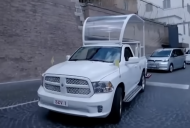In a first, the United Auto Workers (UAW) union has closed factories across the “Big Three” domestic automakers simultaneously.
After an overnight deadline for contract negotiations passed without agreement, and their current contract expired, the UAW launched a “stand up strike”, closing one plant each at GM, Ford and Stellantis in the US.
The plants targeted are the Stellantis’ Toledo, Ohio factory which produces the Jeep Gladiator and Wrangler, Ford’s Michigan Assembly Plant on the outskirts of Detroit that produces the Bronco and Ranger, and GM’s Wentzville site near St Louis that makes the Chevrolet Colorado and GMC Canyon utes, as well as the Chevrolet Express and GMC Savana vans.
Only the Jeep closure is currently likely to have a direct impact on cars sold in Australia, as the Ford Ranger sold Down Under is built in Thailand. Although if the strike continues for more than a few weeks, there could be flow-on effects through contractors and parts of the broader supply chain.
Shawn Fain, president of the UAW, said the roughly 13,000 hourly workers at those three plants would stay on strike “as long as it takes”.
The smaller-than-expected nature of the strikes gives the union scope to ratchet up the pressure on the Big Three without causing, at least for now, too much impact on the broader economy.
It’s understood the union has a US$825 million ($1.28 billion) strike fund which will pay strikers US$500 ($773) per week after the eighth day of the strike.
According to Automotive News, the union’s demands and the automakers’ proposals are still quite far apart. The UAW is asking for a 36 per cent wage increase, but so far the Ford and GM are only offering 20 per cent increases, and Stellantis is proposing just 17.5 per cent.
While these increases may seem large, the union argues executive compensation has grown around 40 per cent, and that its current contract was negotiated a year or two prior to the COVID-19 pandemic, during and after which workers in many other industries enjoyed hefty pay jumps.
The union is also seeking to eliminate the two-tiered wage system, which sees people hired before 2009 retain their pre-existing higher pay and benefits, while newer hires often have lower hourly pay, and less generous health and retirement plans.
The two-tier system was agreed between the union and Big Three after GM and Chrysler went bankrupt during the Global Financial Crisis at the end of the noughts.
Other demands include increased holiday time, cost-of-living indexation, and the conversion of temporary workers into full-time employees.
The current contract negotiations come as Ford, GM and Stellantis are enjoying healthy profits. In the last quarter, GM reported net profit of around US$2.6 billion ($4 billion).
In a statement Ford described the union’s demands as “unsustainable”, but says it remains committed to negotiating an outcomes that “rewards our employees and protects Ford’s ability to invest in the future as we move through industry-wide transformation”.
GM CEO Mary Barra had a slightly more upbeat take, telling CNBC its latest offer was “very generous” and is hopeful for a quick resolution.
“We’re at the table. We’re problem-solving. We want to get this done,” Ms Barra told the business news channel.
Across the border in Canada, the contract between Unifor, the union representing auto workers in Canada, and the Big Three is due to expire on September 18.
Unifor is currently in negotiations with Ford, its “target” automaker, but has rejected the Blue Oval’s latest offers as they “did not come close to meeting our expectations”.







